#da pennebaker
Text
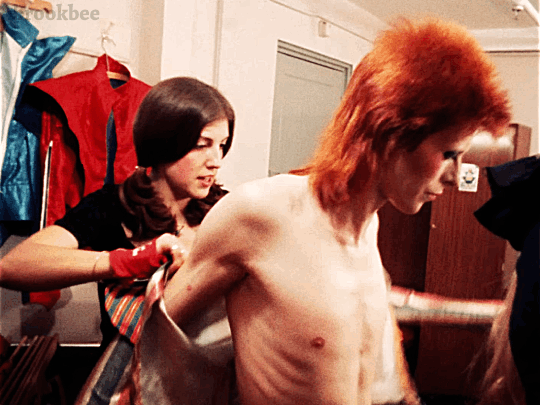




David Bowie back stage at the Hammersmith Odeon, 1973
#i love seeing costumes up close like this so here are some gifs#im not entirely sure what he says in the last one btw the audio isnt synced up great there#david bowie#ziggy stardust#70s fashion#rock n roll#the rise and fall of ziggy stardust and the spiders from mars#da pennebaker#bowieposting#my gifs#hammersmith odeon
1K notes
·
View notes
Photo
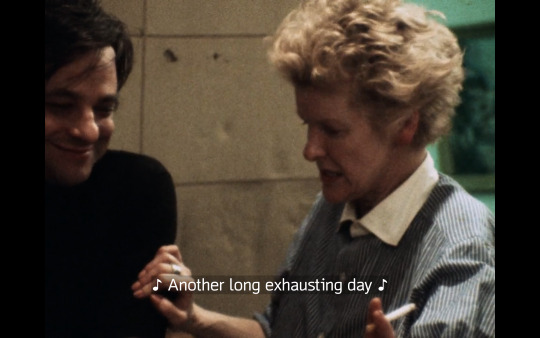
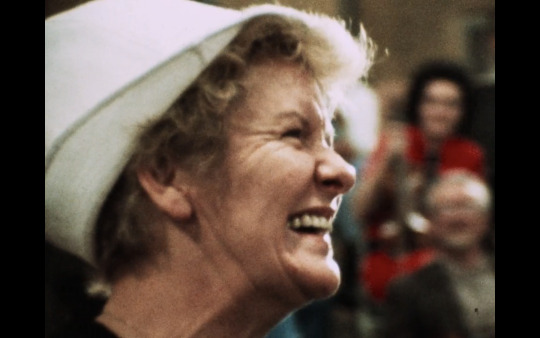
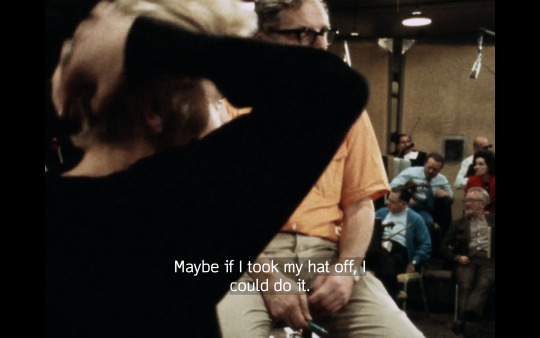


Original Cast Album: Company (1970)
#me logging on and seeing no stills of elaine stritch feeding a dachshund. well i have to do everything myself dont i#elaine stritch#stephen sondheim#original cast album company#da pennebaker#company#m#a
95 notes
·
View notes
Photo

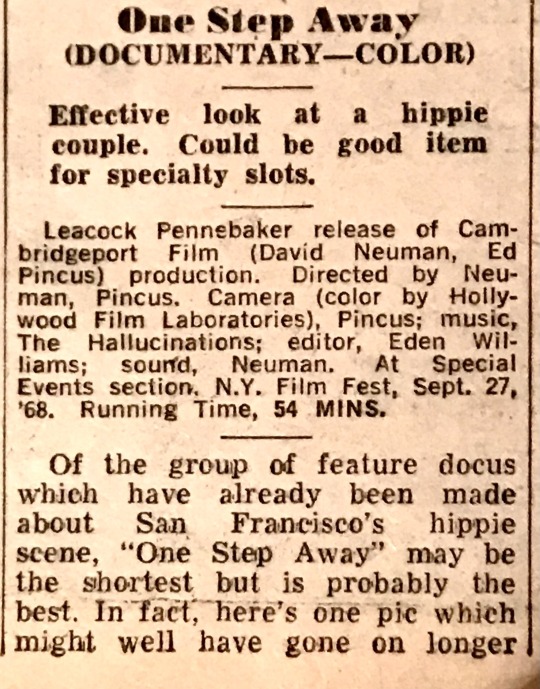
Richard Leacock and D.A. Pennebaker present One Step Away (1968), a cinema verite documentary about a hippie commune that implodes.
20 notes
·
View notes
Text
27 May 1966
During a car ride, Bob Dylan gives John Lennon a history lesson, pointing out "the mighty Thames. That’s what held Hitler back, the mighty Thames."
youtube
It doesn't improve much from there.
22 notes
·
View notes
Text


Ziggy Stardust and the Spiders from Mars (1979)
5 notes
·
View notes
Text

Director DA Pennebaker filming Bob Dylan in Don't Look Back (1967). He was one of four cinematographers with credit for the film. His other notable music documentary is Monterey Pop (1968).
31 notes
·
View notes
Text
Ziggy Stardust and the Spiders from Mars (1979)
The consensus opinion on 1979’s Ziggy Stardust and the Spiders from Mars is that it’s a mediocre document of a magnificent concert. Even its recent re-release was timed to commemorate the 50th anniversary of the 1973 London concert captured on film by D.A. Pennebaker, not the anniversary of the documentary. The newly expanded and remastered version of the film cleans up Pennebaker’s footage in…
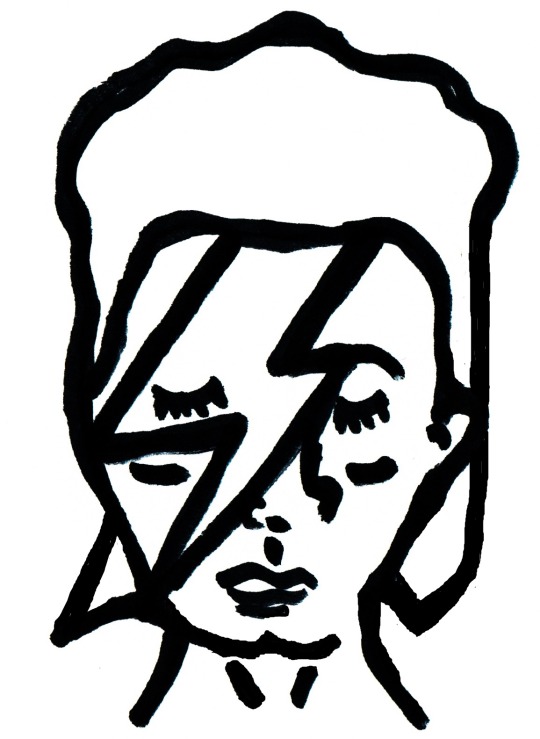
View On WordPress
#brandon ledet#da pennebaker#david bowie#glam rock#jeff beck#mick ronson#reviews#ringo starr#rock n roll#ziggy stardust#ziggy stardust and the spiders from mars
2 notes
·
View notes
Text
Grief cinema
My mom died at the end of 2019, right before lockdown. When covid hit, I was still in a foggy state. My reaction to everything delayed. I am supposed to stay home? Not go outside? Fine! Those were precisely what my plans were for the next mumblemumble years anyway.
My brightest, most vivid memories would have been of the movies that I saw anyway, because movies are special to me and I am always watching them. But the way they informed my grieving process surprised me. One does not necessarily expect, in the moment, for anything to really make it better.
But the day of my mom's death—maybe the day of, maybe the last day that I saw my mom—I watched MIDSOMMAR for the first time. I didn't know the plot and was a little concerned about it but a lot unable to do anything about the way that I felt; the DVD was already in the DVD player, and I knew my mother was dying/dead. Florence Pugh's portrayal of grief was a real gift. I felt held by it. It was miraculous to me, frankly, how much it lifted me into a state of feeling able to engage with what was going on and how I was feeling. There is a rant in me—and it is in there pretty shallow; you can get at it easily—about how acting is a vital service. I feel about actors the way that THE OFFICE's Dwight Schrute feels about his urologist. It is something I cannot do myself all the time, validate my own feelings about life; I need someone to do it for me, and I am grateful.
Also right around the same proximity to my mom's death, I saw the "Original Cast Album: Co-op" episode of DOCUMENTARY NOW! in the midst of watching that season. It was funny, I loved it, it took me out of my troubles, and the milieu was so novel and fascinating to me—this is how a cast recording (something I had never thought about) is/was made?—that I looked up which real documentary the episode was based on.
Before addressing ORIGINAL CAST ALBUM: COMPANY and all it's done for me, a word on Stephen Sondheim:
I will pick up practically any biography of an artist. An all-time choice was the biography of Wendy Wasserstein by Julie Salamon. I didn't know her or her work, and it was such an absorbing book, I think about returning to it all the time. Ditto Michael Schulman's Meryl Streep biography. I love to get a feeling of people in time. The choice to buy Stephen Sondheim's biography was not totally random, but it happened to be on my person when, immediately after my mother's death, I was hit by a car! It wasn't fatal—here I am—it just tipped me over. But I was in a fragile state, I did cry a lot, and I explained to the driver that my mother had just died, and that was why I was crying, and that would be the only reason I cry about anything for a while, regardless of what it seemed like I ought to be crying about. Eventually, I got to a hospital that night to make sure nothing had happened to me, and I was stranded in a room for more than an hour, and all I had was this book about Stephen Sondheim.
I can't remember—I'm sure I could figure it out—whether I had the book before I saw the documentary, whether I'd already seen it by the time I started reading it—but it all feels like it happened more or less at once that I went from not knowing* who Stephen Sondheim was to knowing, you know, the reams of tedious details that a fan knows (how many lines he preferred to have on his yellow legal pads; his go-to chord structure).
As all of this is going on, I've been writing a novel about musicians since 2018, and I made a promise to myself that, once I finished the first draft, I would prioritize learning about music. I never did when I was in school, I always wanted to, and the novel would never be done if I did not understand what my characters are supposed to be doing. I finished the first draft at the very end of 2019, and how fortuitous for this guide to show up, again, more or less all at once (just in time for me to be truly knocked out when he died two years later, more or less exactly from the time of all of this).
The extent to which I've clung to that gift as a life raft during this time is best demonstrated by the fact that, at the end of 2019, I had no knowledge of anything pertaining to music other than liking it, and now I have been composing music since the spring of 2022 (composing was the very long goal, and I still can't get over the fact that I met it). Have I neglected other parts of my life? Big time. But this is still impressive to me considering I would have liked very much to simply pull a blanket over myself and be sad quite ongoingly.
(*- On the subject of "not knowing who Stephen Sondheim was," my only frame of reference was seeing his name in the credits, mostly on item descriptions online, for, like, CDs of the WEST SIDE STORY, INTO THE WOODS, and ASSASSINS cast recordings, all of which I happened to see randomly over the years, but it is the kind of coincidence that would leave one who doesn't know anything about musical theatre to wonder if, maybe, Stephen Sondheim has written every single musical ever.)
Back to the documentary:
Between my discovery of ORIGINAL CAST ALBUM: COMPANY and now, the Criterion Collection has issued an edition of it on DVD and Blu-ray that is beautiful, a dream come true, and it features the DOCUMENTARY NOW! parody episode—magnificent. At the end of 2019, though, my only option for owning it was as a Quicktime file. This is fine—whether or not I have internet access, I have access to ORIGINAL CAST ALBUM: COMPANY.
I have so much to express about ORIGINAL CAST ALBUM: COMPANY, but I will restrict myself only to how it has intermingled with my grieving process. It is, of course, a pleasure to see people lost in work that is demanding but, compared to grieving a loved one's death, a load of cake. In the moment, the first many times I saw it, it came with a fresh, invigorating spray of curiosity-provocation. I love to be curious. Curiosity can do a lot for me. And there is a lot to be curious about for the completely uninitiated when it comes to the byzantine, idiosyncratic, union-forged business practices of Broadway theatre. Knowing how much he loved rules, watching him in this documentary, I am so moved and so happy for Stephen Sondheim that he was from and dwelled in a land that loved rules so much.
I could go on and on and on about how cathartic it is to watch someone be difficult, a ruthless artist, rigid, upholding a high standard as a method of care. I could introduce the subject of Stephen Sondheim and mother issues and we would be here all day. One of the conditions of my loving a thing is that I just go on about it. But when I first saw ORIGINAL CAST ALBUM: COMPANY right around the time that my mother died, the big thing that it did for me was show me, in case I felt like allowing my grief to interfere with my plans, that working on music was going to be good, nice, and right, which in this case were all the same thing.
It's been comforting to rewatch MIDSOMMAR since the end of 2019 and, to be honest with you, I rewatch ORIGINAL CAST ALBUM: COMPANY on a basis so routine that, on second thought, to be honest with you about it would embarrass me too greatly, but the other movie that did something for me in the bewildering swirl that was right-around-the-time-my-mother died, maybe the day it happened, isn't one I revisit, but it is worth noting. I was not going to prepare any food that day, which I barely incentivize myself to do when I'm not pulverized by the cruelty of fate, so I bought, I think, a poké bowl (spicy tuna, etc.) and a Mediterranean-style grain bowl (ancient grains, spicy feta cheese, etc.), and ate them both promptly and simultaneously. I felt sick. I could not do anything lest I risk throwing up. I watched SPACE JAM (I did not throw up! A small miracle).
I am I-saw-SPACE-JAM-in-the-theatre-and-it-was-age-appropriate years old. The soundtrack was a presence in my home. I have no tender feelings about it, but, watching it for the first time as an adult, its ludicrousness did completely take me out of what was happening to my soul and body. That's not nothing!
Maybe more happened then and it isn't coming to me now, but this is how I remember it.
#stephen sondheim#original cast album company#midsommar#space jam#joe pytka#da pennebaker#ari aster#grief#covid
1 note
·
View note
Text
ADVENTURES ON THE NEW FRONTIER:
President unplugged
Coal miners out of the job
Cold War Africa
youtube
#adventures on the new frontier#random richards#poem#haiku#poetry#haiku poem#poets on tumblr#haiku poetry#haiku form#poetic#documentary#criterion collection#criterion channel#Robert Drew#john f kennedy#jfk#Richard Leacock#albert maysles#D.A. Pennebaker#DA pennebaker#Kenneth Stilson#McGeorge Bipundy#Robert F Kennedy#RFK#Youtube
0 notes
Photo
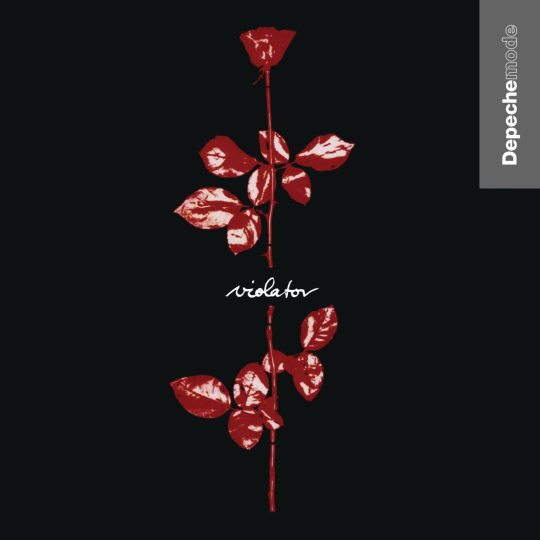
Storia Di Musica #269 - Depeche Mode, Violator, 1990
Le scelte musicali delle domeniche di Aprile avranno come filo rosso la presenza di fiori sulle copertine: di questa caratteristica, alcuni capolavori già sono presenti (il primo che cito è American Beauty dei Grateful Dead, che prende il nome dalla Rosa della stessa varietà, America Beauty, disegnata sulla copertina, o anche Layla & Other Assorted Love Songs che nel dipinto di copertina ha una donna con i fiori) ma è sempre interessante cercare nella mia discoteca e non solo altri grandi dischi che hanno in comune questa caratteristica. Il primo di oggi è uno dei dischi simbolo degli ultimi 35 anni, il vertice di un certo modo di fare musica, arrivato al culmine di un percorso umano e professionale che nell’anno in cui uscì questo lavoro poteva benissimo passare per il risultato dell’opera di sopravvissuti. Tutto nasce a Basildon, nell’Essex, inizio 1980. Tre amici di scuola, Vince Clark, Martin Gore e Andrew “Andy” Fletcher fondano un gruppo, Composition Of Sound. Hanno una caratteristica abbastanza comune all’epoca, cioè abbandonano gli strumenti classici (chitarra, basso, batteria) per focalizzarsi sull’uso delle tastiere elettroniche. Durante una serata in un locale, notano un cantante dalla voce calda e ferma, David “Dave” Graham, che canta una appassionata cover di Heroes di David Bowie, e gli chiedono di unirsi al gruppo, siamo nei primi mesi del 1980. Graham accetta, e suggerisce di cambiare nome alla band: prende spunto da una rivista di moda francese dell'epoca, Dépêche mode, che vuol dire Gazzettino o Almanacco della Moda (e non come dicono molti Moda Passeggera, il termine passeggera deriva dal verbo se dépêcher), lo depurano dagli accenti e nascono i Depeche Mode. La prima pubblicazione è del 1980 su una compilation, Some Bizzarre, poi firmano un contratto con la Mute Records di Daniel Miller, che sarà centrale per la musica indipendente inglese dei primi anni ‘80. Primo singolo di discreto successo, Dreaming Of Me, poi altre canzoni famose in New Life, Just Can’t Get Enough e la pubblicazione del primo disco, Speak And Spell, dove la direzione è chiara: sarà un gruppo orientato ai sintetizzatori. A questo punto Vince Clark, che aveva scritto tutte le canzoni sino a qui, si chiama fuori (continuerà a fare musica con Alison Moyet come Yazoo, e fonderà in seguito anche altri progetti musicali). Il timone delle operazioni di scrittura passa a Martin Gore, che piazza subito una hit in See You. Si aggiunge Alan Wilder, e con questa line up sforneranno un disco all’anno. La prima svolta è del 1986, con Black Celebration: le atmosfera si dilatano, meno dance, base ritmica che picchia più forte e la decisione di spostarsi verso il rock elettronico. Proprio quando il techno pop è crollato, e buona parte della critica aspetta che l’ultimo baluardo, cioè loro, cada, piazzano Music For The Masses (1987) con almeno tre canzoni formidabili (Never Let Me Down, Strangelove e Behind The Wheel), che li porta ad un tour mondiale dove riempiono gli stadi di tutto il mondo (immortalato in parte nel live 101, 1989, anche con un documentario abbinato diretto da D.A. Pennebaker). Si prendono del tempo, e coerenti con il loro credo, decidono di inasprire il sound elettronico, creando un disco dalle atmosfere profondissime, cupe, drammaticamente eleganti. Per registrarlo abbinano la solitudine e il silenzio di un piccolo studio nella campagna danese, a Gjerlev, alla vitalità di Milano, e alla sua vita notturna, presso lo studio Logik, che all’epoca stava a Via Mecenate. Ne viene fuori Violator (1990) che in copertina ha una rosa fiammeggiante, che sembra di lava. Gore dirà dopo anni che voleva giocare sul titolo, scegliendo una parola che evocasse un disco di heavy metal. Quello che fanno è, con l’intuito del fido produttore Flood e l’aiuto al missaggio di François Kevorkian, che fu uno dei collaboratori più stretti dei Kraftwerk, un disco che è l’evoluzione estrema della loro idea musicale (tanto che dopo prenderanno altri riferimenti) e lo fanno in parte rinnegandosi: la batteria spesso non è drum machine ma quella rock, e compariranno nelle loro due più grandi canzoni, entrambe presenti in questo lavoro, persino le chitarre. Eppure l’apertura con World In My Eyes sembra portare sui binari classici, ma già la successiva Sweetest Perfection, con la voce principale di Gore, amplia il concetto, con la batteria rock in primo piano. Arriva il primo colpo da KO, un giro blues, con la chitarra, l’ispirazione presa da Gore leggendo una biografia di Elvis, sulla costruzione di propri idoli, e nasce una delle canzoni più famose del mondo: Personal Jesus, hit mondiale, e ancora oggi uno dei momenti clou di ogni loro esibizione e brano cult da rifare in cover. Halo e la bellissima Waiting For The Night sono da apripista al secondo singolo leggendario: Enjoy The Silence è ispirata e pensata proprio al periodo danese di tranquillità e silenzio circostante (in netto contrasto con quello milanese, dove la band darà il meglio di sé in tutte le feste della città lombarda), anche qui ripropone una chitarra e diventerà iconica, tra l’altro nella versione dell’album dura oltre 6 minuti, con finale in stile ambient, bellissimo, che nella versione singolo e per la stazioni radio è colpevolmente tagliato. Completano il capolavoro la delicata Blue Dress, scritta e cantata da Gore, e le ritmiche Policy Of Truth e la conclusiva Clean, ispirata ad una canzone dei Pink Floyd, One Of These Days, dal loro album Meddle (1971). Tutto funziona alla grande: la voce calda e formale di Graham (che inizierà ad avere devastanti problemi di dipendenza, tormento che segnerà profondamente il loro lavoro successivo, che arriverà solo dopo 3 anni), Gore sempre più padrone del suono Depeche Mode, Fletcher e Wilder a creare il tappeto ritmico che esce vincitore da un decennio dove chiunque si sia ispirato a loro non ha fatto tanta strada. Il disco va in classifica in tutto il mondo, e ha venduto ad oggi 15 milioni di copie, presente in tutte le classifiche dei dischi fondamentali della storia del rock. Sebbene questa sia una storia del rock senza schitarrate, ma formata da avvolgenti suoni elettronici, che ti girano in testa e non ti lasciano scampo.
26 notes
·
View notes
Text
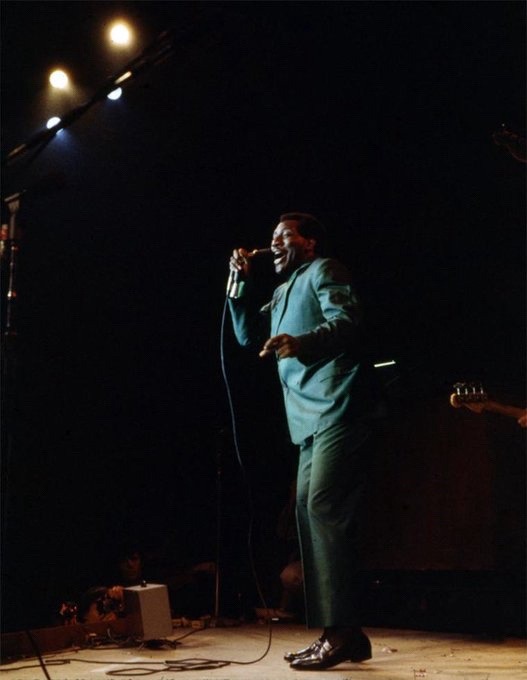
Otis Redding performing at the Monterey Pop Festival, 1967 (DA Pennebaker)
0 notes
Text
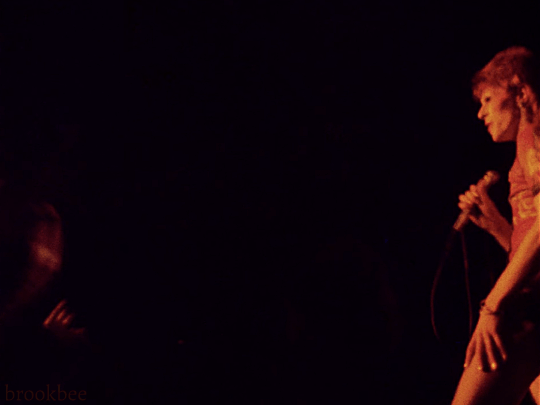

David Bowie performing "Suffragette City," 1973
#the second one is right before he says “wham bam thank you ma'am”#the spiders from mars are there too obviously but they're not in the gifset so it feels weird mentioning them in the caption#david bowie#the rise and fall of ziggy stardust and the spiders from mars#ziggy stardust#suffragette city#da pennebaker#1973#hammersmith odeon#bowieposting#my gifs
528 notes
·
View notes
Text
youtube
D.A. Pennebaker's Eat the Document (1966)
6 notes
·
View notes
Text
Escrever pode ajudar a lidar com traumas da vida
Nos anos 1980, uma pesquisa do psicólogo americano James Pennebaker demostrou que a palavra escrita tem poderes terapêuticos: quem escreve durante alguns dias sobre eventos traumáticos da vida tende a sentir benefícios muito claros em sua saúde física e mental.
Leia mais (10/28/2023 – 09h15)
Artigo Folha de S.Paulo – Equilíbrio e Saúde – Principal Pulicado em https://ift.tt/XY0EHAO
View On WordPress
0 notes
Text

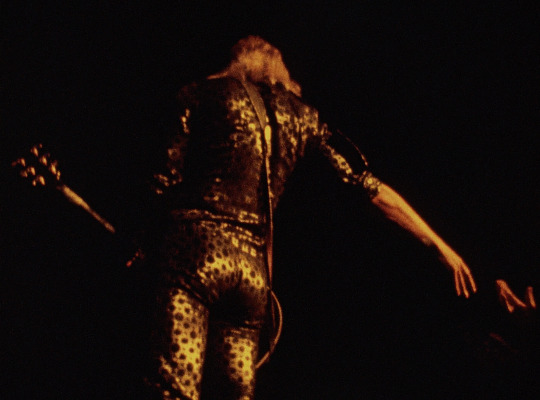








Ziggy Stardust and the Spiders from Mars (1979)
3 notes
·
View notes
Text

Ziggy Stardust And The Spiders From Mars: The Motion Picture @ Cineworld Didsbury, Manchester 3/7/2023
On 3rd July 1973, David Bowie retired Ziggy Stardust - his most celebrated alter-ego - in front of 5000 fans at London's Hammersmith Odeon.
Bowie's performance was captured on film by award-winning director DA Pennebaker and released under the title "Ziggy Stardust And The Spiders From Mars: The Motion Picture".
On 3rd July 2023, The Eventim Apollo (formerly the Odeon) hosted the global premiere of the digitally restored film, and it was simultaneously shown in cinemas worldwide.
#david bowie#ziggy stardust#ziggy stardust and the spiders from mars#history#movie#film#hammersmith odeon#1970s#1973
0 notes